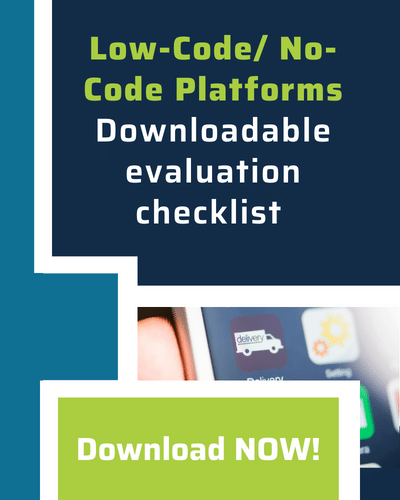In this post-pandemic world, large enterprises are looking to streamline and improve business processes within a storm of marketplace constraints. Companies in asset-heavy industries such as oil and gas, energy, retail, or distribution and logistics have especially been working to reconfigure their supply chain processes to better manage inventory and operations. The focus in the market has shifted from supply chain optimization to supply chain resiliency, creating efficiencies that will help them best survive current delays and rising costs.
Breaking Barriers and Addressing the Talent Shortage
The question is not simply whether companies need to modernize their business applications to increase efficiency and lower costs, but how to accomplish a necessary modernization in the midst of barriers like rising costs, supply chain disruptions and a severe shortage of developer talent. Developers and DevOps teams need to find ways to do more with less.
The reimagining of business processes is an excellent strategy to reduce overhead and allow companies to become nimbler and more efficient, consequently helping them preserve or improve marketshare. Many large enterprises work in environments that use enterprise resource planning (ERP) software; systems that, over the years, have been subject to ongoing upgrades, patches and redesigns by developers and IT managers. This creates technical debt, which makes it difficult for many of these large-scale companies to migrate their business applications to cloud-based systems.
Many of these ERP-based companies are facing pressure to update to more modern, cloud-based versions of their ERP platforms. But they must run a gauntlet to modernize their legacy applications. In a sense, companies that maintain these complex ERP-based systems find the environments are like “golden handcuffs.” They have become so complicated over time that they restrain IT departments’ innovation efforts, hindering their ability to create supply chain resiliency when it is most needed.
To make matters more difficult, the current market is facing a global shortage of human resources required to get the job of digital transformation and application modernization done, including skilled ERP developers—especially those skilled in more antiquated languages like ABAP. Incoming developer talent is often trained in more contemporary languages like Java, Steampunk and Python. These graduates have their pick of opportunities and gravitate to companies that already work in these newer programming environments.
ERP migrations can be hampered by complex, customized systems developed by high-priced, silo-skilled programmers. Many enterprise leaders have a great desire to break out of these restrictions and modernize legacy applications with greater speed and at lower cost, and they need to do so with minimal downtime and disruption.
Leverage Low-Code Solutions to Modernize
In a 2022 report on application development strategies, industry analyst Deepa Salem interviewed enterprise companies that used sophisticated SAP-based ERP solutions about their approach to software modernization strategies. More than 80% of respondents said they planned to upgrade their business applications in conjunction with a major migration of their ERP software platform to the latest, cloud-based version.
This tactic of implementing a new applications strategy in coordination with a major refresh is not surprising and presents an opportunity for developers to help these companies “clean house,” reducing the technical debt of their legacy environments at this well-timed juncture.
As an analogy, think about how people typically move to a new residence. Homeowners sift through their accumulated possessions and identify what’s no longer needed. They pack what is still valuable and essential. A low-code application process can help clean up existing ERP environments prior to migration, reducing complexity and long-accumulated technical debt while leveraging the system’s unique business intelligence. The tribal knowledge inherent in any legacy system is critical to retaining market differentiation.
With so much at stake, IT departments and developers should give serious consideration to using pre-built, customizable business applications, efficiently and rapidly created through a low-code development process. Deployment-ready solutions can help developers move forward with modernization projects that have been hampered or shelved due to a lack of talent to implement those jobs. They can accomplish more with less.
With the right approach, ERP-based environments can be reconfigured to quickly establish more agile, streamlined and cost-effective business applications. Developers have a unique opportunity to help enterprises keep what sets them apart from the competition and surrender what no longer serves them. In this climate, this is not a nicety for enterprise customers. It’s about resilience—and even survival.



 Back
Back/Logo%20-%20black%20text%20blue%20pillar%20(large)-1.jpg)

